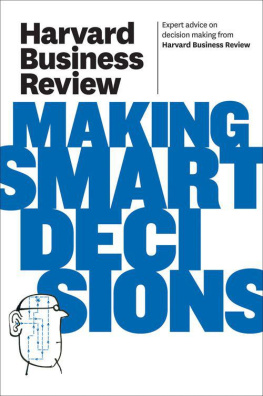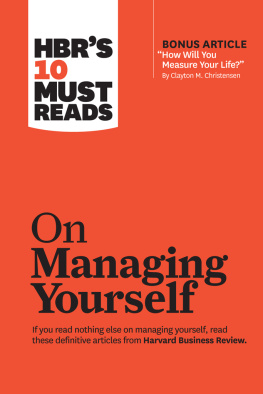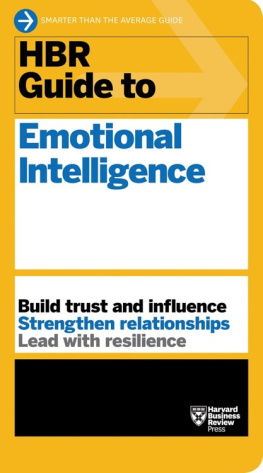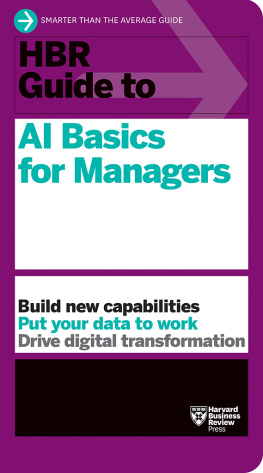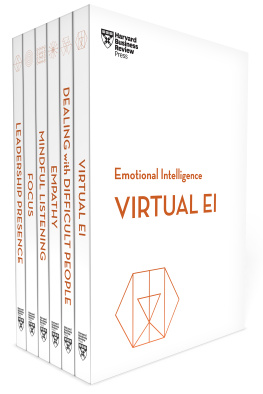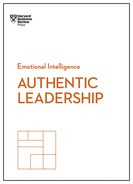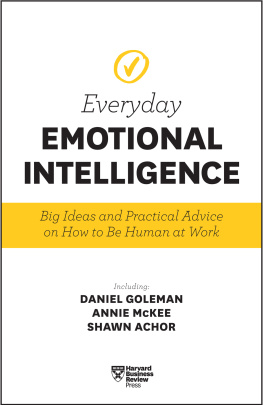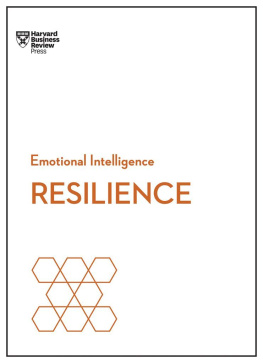Self-Awareness
HBR EMOTIONAL INTELLIGENCE SERIES
HBR Emotional Intelligence Series
How to be human at work
The HBR Emotional Intelligence Series features smart, essential reading on the human side of professional life from the pages of Harvard Business Review.
Authentic Leadership
Confidence
Dealing with Difficult People
Empathy
Focus
Happiness
Influence and Persuasion
Leadership Presence
Mindful Listening
Mindfulness
Purpose, Meaning, and Passion
Resilience
Self-Awareness
Other books on emotional intelligence from Harvard Business Review:
HBR Everyday Emotional Intelligence
HBR Guide to Emotional Intelligence
HBRs 10 Must Reads on Emotional Intelligence
Self-Awareness
HBR EMOTIONAL INTELLIGENCE SERIES
Harvard Business Review Press
Boston, Massachusetts
HBR Press Quantity Sales Discounts
Harvard Business Review Press titles are available at significant quantity discounts when purchased in bulk for client gifts, sales promotions, and premiums. Special editions, including books with corporate logos, customized covers, and letters from the company or CEO printed in the front matter, as well as excerpts of existing books, can also be created in large quantities for special needs.
For details and discount information for both print and ebook formats, contact .
Copyright 2019 Harvard Business School Publishing Corporation
All rights reserved
Printed in the United States of America
10 9 8 7 6 5 4 3 2 1
No part of this publication may be reproduced, stored in or introduced into a retrieval system, or transmitted, in any form, or by any means (electronic, mechanical, photocopying, recording, or otherwise), without the prior permission of the publisher. Requests for permission should be directed to , or mailed to Permissions, Harvard Business School Publishing, 60 Harvard Way, Boston, Massachusetts 02163.
The web addresses referenced in this book were live and correct at the time of the books publication but may be subject to change.
Library of Congress Cataloging-in-Publication Data
Title: Self-awareness.
Other titles: HBR emotional intelligence series.
Description: Boston, Massachusetts : Harvard Business Review Press, [2018] Series: HBR emotional intelligence series
Identifiers: LCCN 2018022311 | ISBN 9781633696617 (pbk. : alk. paper)
Subjects: LCSH: Self-consciousness (Awareness) | EmployeesPsychology. | Management. | Emotional intelligence.
Classification: LCC BF311 .S4345 2018 | DDC 153dc23
LC record available at https://lccn.loc.gov/2018022311
ISBN: 978-1-63369-661-7
eISBN: 978-1-63369-662-4
The paper used in this publication meets the requirements of the American National Standard for Permanence of Paper for Publications and Documents in Libraries and Archives Z39.48-1992.
Contents
The key to understanding your emotions, strengths, and weaknesses.
By Daniel Goleman
See yourself from the inside and outside.
By Tasha Eurich
Lessons from the greats.
By Bernie Swain
Know what drives you.
By Robert Steven Kaplan
Accept your feelings and act on your values.
By Susan David and Christina Congleton
Stop dreading it and start small.
By Jennifer Porter
A data-driven path to knowing yourself.
By H. James Wilson
Two questions to get real feedback.
By Kristi Hedges
Show youre committed to self-improvement.
By Deborah Grayson Riegel
Counter your natural resistance.
By Sheila Heen and Douglas Stone
To change yourself, discover yourself.
By Declan Fitzsimons
Self-Awareness
HBR EMOTIONAL INTELLIGENCE SERIES
1
The First Component of Emotional Intelligence
By Daniel Goleman
Self-awareness is the first component of emotional intelligencewhich makes sense when one considers that the Delphic oracle gave the advice to know thyself thousands of years ago. Self-awareness means having a deep understanding of ones emotions, strengths, weaknesses, needs, and drives. People with strong self-awareness are neither overly critical nor unrealistically hopeful. Rather, they are honestwith themselves and with others.
People who have a high degree of self-awareness recognize how their feelings affect them, other people, and their job performance. Thus, a self-aware person who knows that tight deadlines bring out the worst in him plans his time carefully and gets his work done well in advance. Another person with high self-awareness will be able to work with a demanding client. She will understand the clients impact on her moods and the deeper reasons for her frustration. Their trivial demands take us away from the real work that needs to be done, she might explain. And she will go one step further and turn her anger into something constructive.
Self-awareness extends to a persons understanding of his or her values and goals. Someone who is highly self-aware knows where he is headed and why; so, for example, he will be able to be firm in turning down a job offer that is tempting financially but does not fit with his principles or long-term goals. A person who lacks self-awareness is apt to make decisions that bring on inner turmoil by treading on buried values. The money looked good so I signed on, someone might say two years into a job, but the work means so little to me that Im constantly bored. The decisions of self-aware people mesh with their values; consequently, they often find work to be energizing.
How can one recognize self-awareness? First and foremost, it shows itself as candor and an ability to assess oneself realistically. People with high self-awareness are able to speak accurately and openlyalthough not necessarily effusively or confessionallyabout their emotions and the impact they have on their work. For instance, one manager I know of was skeptical about a new personal-shopper service that her company, a major department-store chain, was about to introduce. Without prompting from her team or her boss, she offered them an explanation: Its hard for me to get behind the rollout of this service, she admitted, because I really wanted to run the project, but I wasnt selected. Bear with me while I deal with that. The manager did indeed examine her feelings; a week later, she was supporting the project fully.
Such self-knowledge often shows itself in the hiring process. Ask a candidate to describe a time he got carried away by his feelings and did something he later regretted. Self-aware candidates will be frank in admitting to failureand will often tell their tales with a smile. One of the hallmarks of self-awareness is a self-deprecating sense of humor.
Self-awareness can also be identified during performance reviews. Self-aware people knowand are comfortable talking abouttheir limitations and strengths, and they often demonstrate a thirst for constructive criticism. By contrast, people with low self-awareness interpret the message that they need to improve as a threat or a sign of failure.
Self-aware people can also be recognized by their self-confidence. They have a firm grasp of their capabilities and are less likely to set themselves up to fail by, for example, overstretching on assignments. They know, too, when to ask for help. And the risks they take on the job are calculated. They wont ask for a challenge that they know they cant handle alone. Theyll play to their strengths.
Consider the actions of a midlevel employee who was invited to sit in on a strategy meeting with her companys top executives. Although she was the most junior person in the room, she did not sit there quietly, listening in awestruck or fearful silence. She knew she had a head for clear logic and the skill to present ideas persuasively, and she offered cogent suggestions about the companys strategy. At the same time, her self-awareness stopped her from wandering into territory where she knew she was weak.


